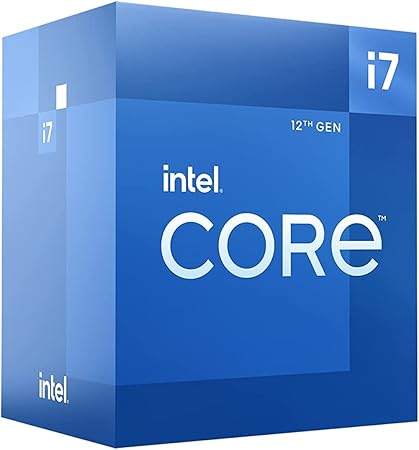Intel Core i7-12700

The Intel Core i7-12700 processor features 12 cores and 20 threads, making it an excellent choice for both gaming and multitasking. With a base clock speed of 2.1 GHz and a maximum boost clock of 4.9 GHz, it delivers strong performance for demanding applications.
Popularity: Low
Performance:
Specifications:
Model: Intel Core i7-12700
Series: 12th Generation Intel® Core™ i7 Processors
Architecture: Alder Lake
Socket: 1700
Cores: 12
Threads: 20
Base Clock: 2.10 GHz
Max. Boost Clock: 4.90 GHz
L2 Cache: 12 MB
L3 Cache: 25 MB Intel® Smart Cache
TDP: 65 W
Power Consumption: 190.0 W
Max Memory: 128 GB
Max Memory Speed: Up to DDR5 4800 MT/s, Up to DDR4 3200 MT/s
Max Temp: 100 °C
PCI Express Version: 5.0 and 4.0
PCIe Lanes: 20
Overclocking:
Integrated GPU: Yes
Cooler Boxed: yes
Instruction Set: 64-bit
Launch Date: Q1'22
Manufacturer Page: Link
Review
The Intel Core i7-12700 from Intel's Alder Lake lineup represents a step forward for the company, reaffirming its competitive edge in the CPU market. Featuring 12 cores and 20 threads, this processor integrates eight performance cores with four efficiency cores, providing a versatile and robust performance profile suitable for high-end gaming and demanding multitasking. Offering a balance between cost-efficiency and raw power, it promises to deliver value and capability without breaking the bank.
Performance and Core Architecture
The blend of a maximum boost clock speed of 4.9 GHz and a base clock of 2.1 GHz ensures the Intel Core i7-12700 stands out in tasks demanding both core saturation and clock speed dynamism. The processor is built on the Intel 7 (10nm) process, aligned to compete with TSMC's 7nm offerings. With Golden Cove and Gracemont cores, the Alder Lake processor provides significant efficiency improvements over previous Intel modelsArs Technica.
Compatibility and Future-Proofing
Adopting PCIe 5.0 and DDR5 memory compatibility makes the Intel Core i7-12700 notably future-proof. It has a PL1 of 65W and a PL2 of 165W, allowing for substantial operational headroom, particularly advantageous when paired with the Z690 chipset for enhanced power delivery and sustained performanceWindows Central.
Gaming and Benchmark Performance
In gaming, the Intel Core i7-12700 performs closely with the higher-end Core i9-12900K, with minimal differences across a host of tested games like Doom Eternal and Shadow of the Tomb Raider. While it trails slightly in some synthetic benchmarks when compared to the i9, it nonetheless surpasses the AMD Ryzen 7 5800X in many gaming scenariosWindows Central. The chart-topping performance metrics reinforce its appeal for enthusiasts not requiring overclocking capabilities.
Power Efficiency and Overclocking
While the Intel Core i7-12700 is locked and hence not an ideal choice for overclockers, its efficiency—especially under load—showcases Intel's focus on power management, a department where it historically lagged behind AMD. Efficiency improvements have been a notable upside with Alder Lake, marking a dramatic shift in Intel's previously power-hungry designsTechPowerUp.
Conclusion and Value Proposition
The Intel Core i7-12700 marks a significant shift back into competition territory for Intel, presenting an attractive option both in terms of price and performance within its Alder Lake lineup. While AMD edges out in sheer efficiency, Intel’s Core i7-12700 outperforms many AMD counterparts, portraying a compelling option for users focused on gaming and multitasking without diving into the chip’s more expensive variants or overclocking adventures.